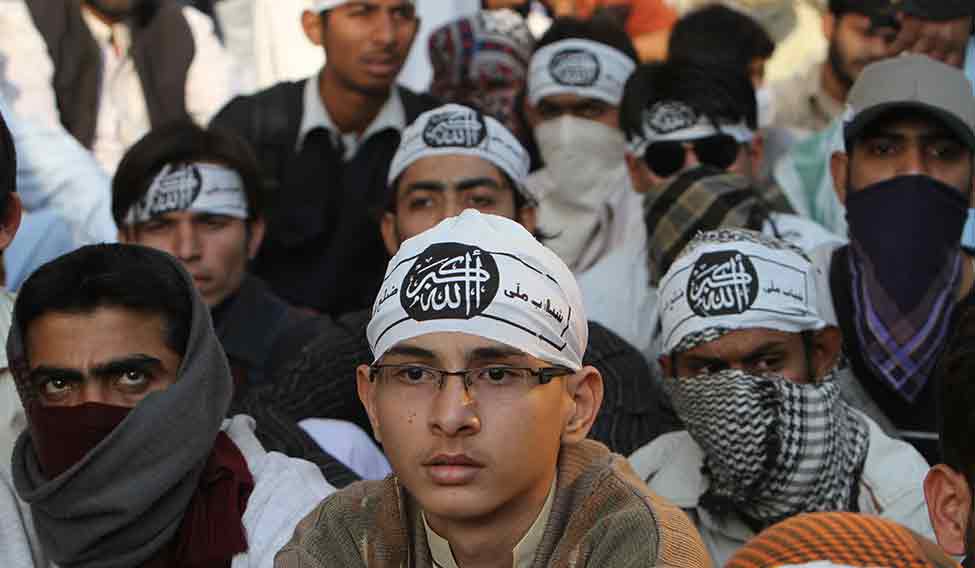Babar Zaman Khan is certain of his goals. “The aim is, we are going for a third world war. We have to secure our Muslim countries for World War III,” he said.
Clean shaven and urbane, Khan is an MA student at the University of Karachi. He says he had studied briefly at Nottingham Trent, where he played cricket, although the British university has no record of him. The group he runs now, the Islamic Students’ Movement of Pakistan, has aligned itself with Islamic State. “We have a link to Daesh, to some leaders of Daesh out of the country, through one of our members,” he said. The group focuses on spreading propaganda through leaflets and study groups.
In Pakistan, IS is targeting educated members of the middle and upper classes. “Previous militants were frequently from lower-income households where the appeal of religion, Sharia law, was very high,” said Zoha Waseem, a researcher at the department of war studies of King’s College London. “With Daesh the package has changed completely. You don’t have to abandon your family, you don’t have to fight or train on how to use weapons, you don’t have to go live in the mountains. The propaganda is very sophisticated compared with Al-Qaeda. It’s offering urban youth the chance to be part of something bigger.”
Khan underlined a generational shift. “In Karachi at the moment we have thousands of fans,” he said. “Not typical religious people—modern girls, modern boys.” In March, Karachi Police arrested Ubaid Ahmed Khan, a lecturer in Islamic studies at the University of Karachi, on suspicion of trying to establish an IS cell. Documents retrieved from his laptop revealed IS pamphlets in Urdu.
I met several students in Karachi who supported IS. Most of them said they were not directly involved in violence but justified acts of terrorism as retaliation. “You need to differentiate between terrorism and radicalism,” said Kashif Warsi, a student. “We are not terrorists but when we assess ourselves we are supporting terrorism in terms of funding. It’s the ‘social corporate responsibility’ side. It’s not about Daesh, it’s about supporting Muslims.”
Analysts agree that most of these IS supporters are not taking up arms, but some have turned to violence, and a heightened risk of lone-wolf attacks remains. An IS cell was convicted of attacks in Karachi, including the shooting of 46 Ismaili Muslims in May last year and the murder of the human rights activist Sabeen Mahmud the previous month. Saad Aziz, the most prominent attacker, was a graduate of the prestigious Institute of Business Administration in Karachi. Two others had degrees from the University of Karachi.
Although many of the new generation of militants have become radicalised online, Pakistan has a lot of conservative religious organisations operating in and around universities. Some have declared allegiance to IS. Saut-ul-Ummah, which is based in Lahore, started in 2007 as a splinter group of Hizb-ut-Tahrir, the islamist group with roots in the UK that claims to be non-violent. Last year Saut-ul-Ummah decided that it would be in keeping with its goal of establishing a caliphate to declare allegiance to IS.
A commander of Wilyat Khorasan, the Afghan branch of IS, visited Lahore to meet the group last summer, according to a senior counter-terrorism official in the city. Soon afterwards, the police arrested more than 70 Saut-ul-Ummah members, about 30 of whom remain in custody. “They include professors at our top universities, medical doctors, and people working for multinationals,” the official said. “Daesh strategy in Pakistan is targeting the intelligentsia.”
Law enforcement agencies are keen to play down the significance of such terrorist cells. “Daesh has been exposed several times in Pakistan but these cells do not have any links to each other,” said Raja Umar Khattab, head of counter-terrorism in Karachi’s police force. “They are inspired by Daesh, it’s true, but there is no platform where they can join together.”
This urbane generation of tech savvy and educated recruits pose new challenges for Pakistan’s police who lack the technology or manpower to monitor online communications effectively. “They are not using any cellular system—they only use the internet, apps like Telegraph or Telegram, so we are not able to arrest them through the phone systems,” Khattab said. Karachi was once a stronghold of the Pakistan Taliban. In the suburb of Sohrab Goth, abandoned buildings used by the Taliban to plot attacks are ridden with bullet holes. Yet throughout these areas pro-IS graffiti is now an increasingly common sight. “The TTP [Tehreek-e-Taliban Pakistan] is finished in urban areas, so some militants have moved to Daesh for shelter,” said Ehsan Marhat, a senior police officer.
Police officers have been told that they will be suspended if they do not deal with the graffiti. Lacking resources, officers simply paint over it, turning ISIS into H8H8. This inscription is now seen throughout Pakistan’s cities.






